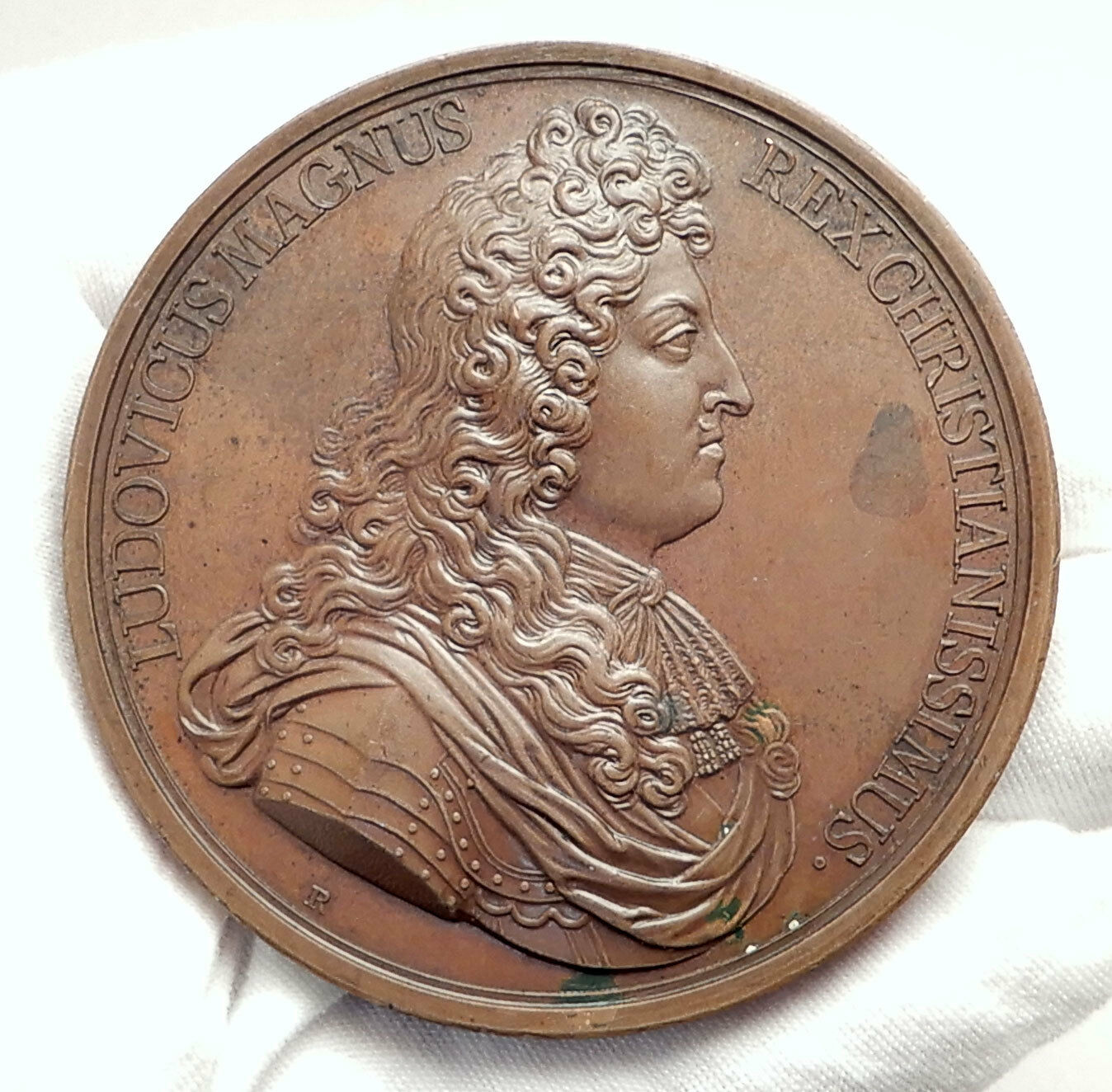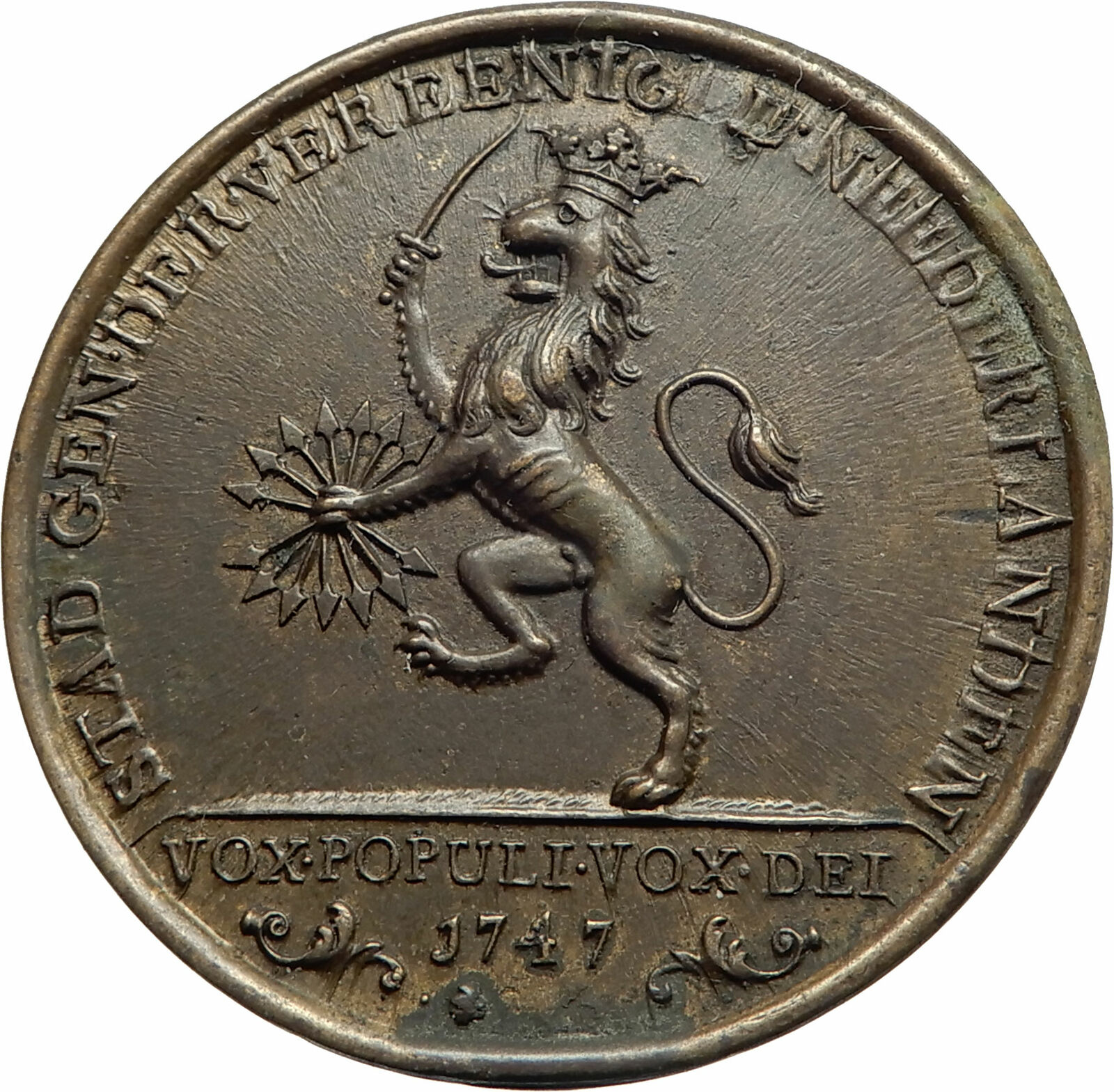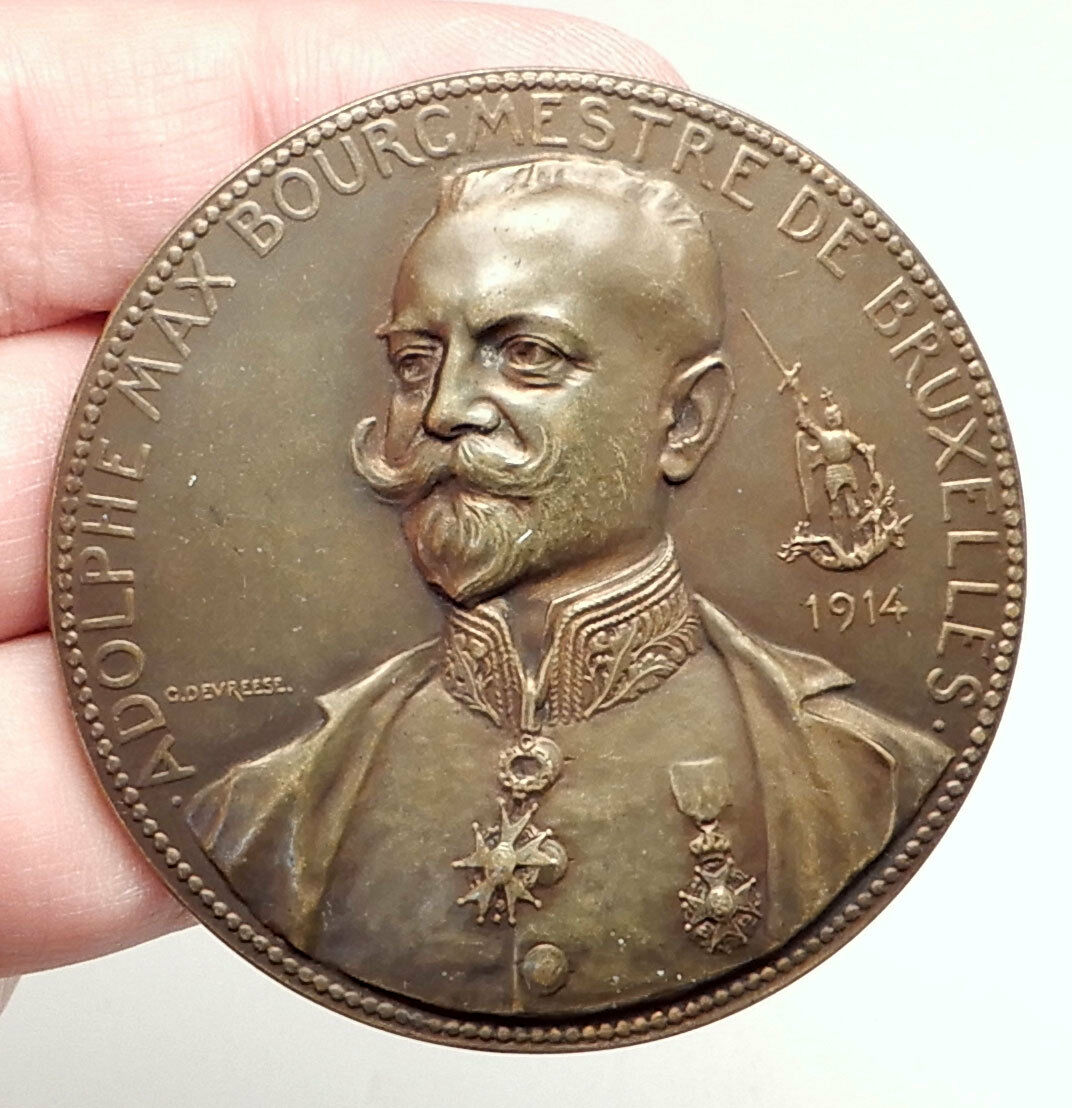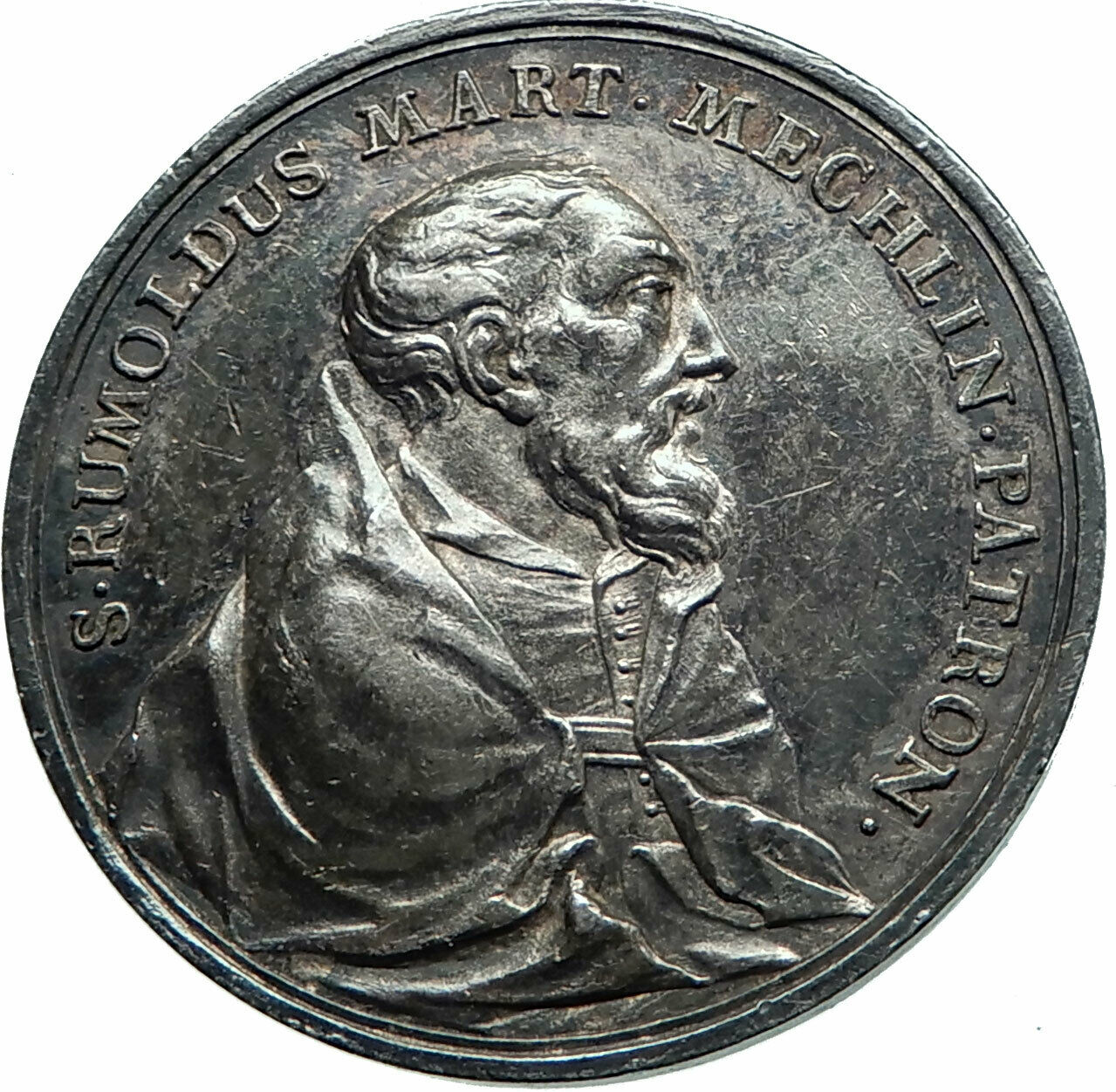|
Argentina
General Domingo F. Sarmiento
1911 Silver-plated Bronze Medal 56mm x 87mm (141.20 grams)
TENIENTE GENERAL NICOLAS LEVALLE 1840-1902, General facing 1/5 right.
11 OCTUBRE 1869 – 5 OCTUBRE 1872 1811 1911 EL COLEGIO MILITAR Y LA
ESCUELA NAVAL DE LA NAVION A SU FUNDADOR GENERAL DOMINGO F. SARMIENTO, Domingo
facing within wreathed circle, generals supporting, naval scene center,
Coat-of-arms below.
PRESIDENTE DE LA NACION ARGENTINA DR ROQUE SAENZ PENA MINISTRO DE GUERRA GENERAL
GREGORIO VELEZ MINISTRO DE MARINA CONTRALMIRANTE J P SAENZ VALIENTE, Wreath atop
and around, anchor and ships’s wheel below with crossed rifle and sword.
You are bidding on the exact item pictured, provided with a Certificate of Authenticity and Lifetime Guarantee of Authenticity.
Domingo Faustino Sarmiento (February 15, 1811 – September 11, 1888) was an Argentine activist, intellectual, writer, statesman and the second President of Argentina. His writing spanned a wide range of genres and topics, from journalism to autobiography, to political philosophy and history. He was a member of a group of intellectuals, known as the Generation of 1837, who had a great influence on 19th-century Argentina. He was particularly concerned with educational issues and was also an important influence on the region’s literature.
 Sarmiento grew up in a poor but politically active family that paved the way for many of his future accomplishments. Between 1843 and 1850 he was frequently in exile, and wrote in both Chile and in Argentina. His greatest literary achievement was Facundo, a critique of Juan Manuel de Rosas, that Sarmiento wrote while working for the newspaper El Progreso during his exile in Chile. The book brought him far more than just literary recognition; he expended his efforts and energy on the war against dictatorships, specifically that of Rosas, and contrasted enlightened Europe—a world where, in his eyes, democracy, social services, and intelligent thought were valued—with the barbarism of the gaucho and especially the caudillo, the ruthless strongmen of nineteenth-century Argentina. Sarmiento grew up in a poor but politically active family that paved the way for many of his future accomplishments. Between 1843 and 1850 he was frequently in exile, and wrote in both Chile and in Argentina. His greatest literary achievement was Facundo, a critique of Juan Manuel de Rosas, that Sarmiento wrote while working for the newspaper El Progreso during his exile in Chile. The book brought him far more than just literary recognition; he expended his efforts and energy on the war against dictatorships, specifically that of Rosas, and contrasted enlightened Europe—a world where, in his eyes, democracy, social services, and intelligent thought were valued—with the barbarism of the gaucho and especially the caudillo, the ruthless strongmen of nineteenth-century Argentina.
While president of Argentina from 1868 to 1874, Sarmiento championed intelligent thought—including education for children and women—and democracy for Latin America. He also took advantage of the opportunity to modernize and develop train systems, a postal system, and a comprehensive education system. He spent many years in ministerial roles on the federal and state levels where he travelled abroad and examined other education systems.
Sarmiento died in Asunción, Paraguay, at the age of 77 from a heart attack. He was buried in Buenos Aires. Today, he is respected as a political innovator and writer. Miguel de Unamuno considered him among the greatest writers of Castilian prose.
 Argentina, officially the Argentine Republic (Spanish: República Argentina), is a federal republic located mostly in the southern half of South America. Sharing the bulk of the Southern Cone with its neighbor Chile to the west, the country is also bordered by Bolivia and Paraguay to the north, Brazil to the northeast, Uruguay and the South Atlantic Ocean to the east, and the Drake Passage to the south. With a mainland area of 2,780,400 km2 (1,073,500 sq mi), Argentina is the eighth-largest country in the world, the second largest in Latin America, and the largest Spanish-speaking nation. It is subdivided into twenty-three provinces (Spanish: provincias, singular provincia) and one autonomous city (ciudad autónoma), Buenos Aires, which is the federal capital of the nation (Spanish: Capital Federal) as decided by Congress. The provinces and the capital have their own constitutions, but exist under a federal system. Argentina claims sovereignty over part of Antarctica, the Falkland Islands (Spanish: Islas Malvinas), and South Georgia and the South Sandwich Islands. Argentina, officially the Argentine Republic (Spanish: República Argentina), is a federal republic located mostly in the southern half of South America. Sharing the bulk of the Southern Cone with its neighbor Chile to the west, the country is also bordered by Bolivia and Paraguay to the north, Brazil to the northeast, Uruguay and the South Atlantic Ocean to the east, and the Drake Passage to the south. With a mainland area of 2,780,400 km2 (1,073,500 sq mi), Argentina is the eighth-largest country in the world, the second largest in Latin America, and the largest Spanish-speaking nation. It is subdivided into twenty-three provinces (Spanish: provincias, singular provincia) and one autonomous city (ciudad autónoma), Buenos Aires, which is the federal capital of the nation (Spanish: Capital Federal) as decided by Congress. The provinces and the capital have their own constitutions, but exist under a federal system. Argentina claims sovereignty over part of Antarctica, the Falkland Islands (Spanish: Islas Malvinas), and South Georgia and the South Sandwich Islands.
 
Flag & Coat of arms
The earliest recorded human presence in the area of modern-day Argentina dates back to the Paleolithic period. The country has its roots in Spanish colonization of the region during the 16th century. Argentina rose as the successor state of the Viceroyalty of the Río de la Plata, a Spanish overseas viceroyalty founded in 1776. The declaration and fight for independence (1810-1818) was followed by an extended civil war that lasted until 1861, culminating in the country’s reorganization as a federation of provinces with Buenos Aires as its capital city. The country thereafter enjoyed relative peace and stability, with massive waves of European immigration radically reshaping its cultural and demographic outlook. The almost-unparalleled increase in prosperity led to Argentina becoming the seventh wealthiest developed nation in the world by the early 20th century.
After 1930, Argentina descended into political instability and periodic economic crises that pushed it back into underdevelopment, though it nevertheless remained among the fifteen richest countries until the mid-20th century. Argentina retains its historic status as a middle power in international affairs, and is a prominent regional power in the Southern Cone and Latin America. Argentina has the second largest economy in South America, the third-largest in Latin America and is a member of the G-15 and G-20 major economies. It is also a founding member of the United Nations, World Bank, World Trade Organization, Mercosur, Union of South American Nations, Community of Latin American and Caribbean States and the Organization of Ibero-American States. It is the country with the second highest Human Development Index in Latin America with a rating of “very high”. Because of its stability, market size and growing high-tech sector, Argentina is classified as an upper-middle-income economy in the 2018 fiscal year.
|




 Sarmiento grew up in a poor but politically active family that paved the way for many of his future accomplishments. Between 1843 and 1850 he was frequently in exile, and wrote in both Chile and in Argentina. His greatest literary achievement was Facundo, a critique of Juan Manuel de Rosas, that Sarmiento wrote while working for the newspaper El Progreso during his exile in Chile. The book brought him far more than just literary recognition; he expended his efforts and energy on the war against dictatorships, specifically that of Rosas, and contrasted enlightened Europe—a world where, in his eyes, democracy, social services, and intelligent thought were valued—with the barbarism of the gaucho and especially the caudillo, the ruthless strongmen of nineteenth-century Argentina.
Sarmiento grew up in a poor but politically active family that paved the way for many of his future accomplishments. Between 1843 and 1850 he was frequently in exile, and wrote in both Chile and in Argentina. His greatest literary achievement was Facundo, a critique of Juan Manuel de Rosas, that Sarmiento wrote while working for the newspaper El Progreso during his exile in Chile. The book brought him far more than just literary recognition; he expended his efforts and energy on the war against dictatorships, specifically that of Rosas, and contrasted enlightened Europe—a world where, in his eyes, democracy, social services, and intelligent thought were valued—with the barbarism of the gaucho and especially the caudillo, the ruthless strongmen of nineteenth-century Argentina. Argentina, officially the Argentine Republic (Spanish: República Argentina), is a federal republic located mostly in the southern half of South America. Sharing the bulk of the Southern Cone with its neighbor Chile to the west, the country is also bordered by Bolivia and Paraguay to the north, Brazil to the northeast, Uruguay and the South Atlantic Ocean to the east, and the Drake Passage to the south. With a mainland area of 2,780,400 km2 (1,073,500 sq mi), Argentina is the eighth-largest country in the world, the second largest in Latin America, and the largest Spanish-speaking nation. It is subdivided into twenty-three provinces (Spanish: provincias, singular provincia) and one autonomous city (ciudad autónoma), Buenos Aires, which is the federal capital of the nation (Spanish: Capital Federal) as decided by Congress. The provinces and the capital have their own constitutions, but exist under a federal system. Argentina claims sovereignty over part of Antarctica, the Falkland Islands (Spanish: Islas Malvinas), and South Georgia and the South Sandwich Islands.
Argentina, officially the Argentine Republic (Spanish: República Argentina), is a federal republic located mostly in the southern half of South America. Sharing the bulk of the Southern Cone with its neighbor Chile to the west, the country is also bordered by Bolivia and Paraguay to the north, Brazil to the northeast, Uruguay and the South Atlantic Ocean to the east, and the Drake Passage to the south. With a mainland area of 2,780,400 km2 (1,073,500 sq mi), Argentina is the eighth-largest country in the world, the second largest in Latin America, and the largest Spanish-speaking nation. It is subdivided into twenty-three provinces (Spanish: provincias, singular provincia) and one autonomous city (ciudad autónoma), Buenos Aires, which is the federal capital of the nation (Spanish: Capital Federal) as decided by Congress. The provinces and the capital have their own constitutions, but exist under a federal system. Argentina claims sovereignty over part of Antarctica, the Falkland Islands (Spanish: Islas Malvinas), and South Georgia and the South Sandwich Islands.






